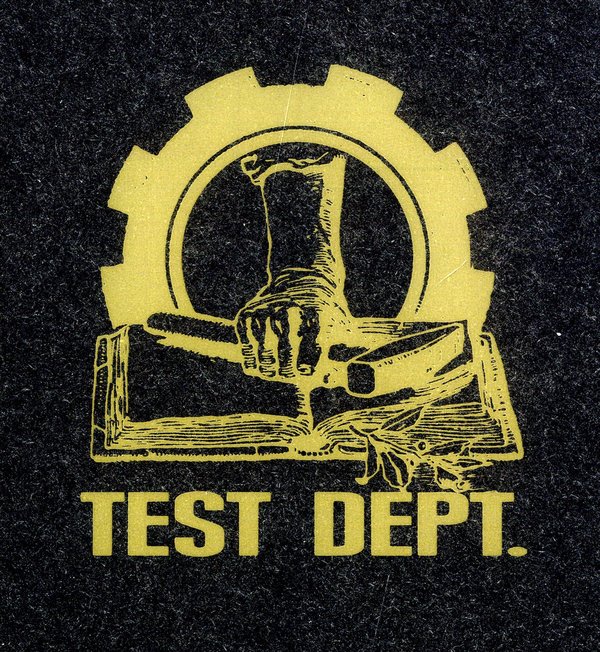
We are very sad to hear of the passing of Ken Thomas. A truly genius producer and a very wonderful man.
He produced four TD albums: Beating The Retreat; The Unacceptable Face of Freedom; Gododdin; Pax Britannica; playing a major part in helping to forge the early recorded TD sound.
He resonated with us and we think we did with him too, each with the same desire to push the boundaries and to think outside the box.
With his cheeky smile and wild laugh as he came up with another crazy idea, it was always beautiful to be in his company and such an honour to have had the pleasure to work with him on so many occasions. He taught us so much along the way.
Such a great loss but beautiful memories and a colossal legacy to be sure.
Our thoughts are with the Thomas clan.
Rest in peace Ken, and thank you for bringing your passion, energy and unique vision. You will be missed.
Concrete Sound
In conversation with Ken Thomas.
Quotes from our discussion with Ken Thomas in our book Total State Machine (PC Press) (PJ: Paul Jamrozy. GC: Gray Cunnnington. KT: Ken Thomas.)
https://pc-press.co.uk/about-the-book-test-dept-total-state-machine/
For Beating the Retreat we went down to Jacobs Farm studios in Surrey in our Black Bus. It was a strange setting to find ourselves recording our first album in.
The reason we went there was of course that it was where the legendary Ken Thomas was set up as house producer. He oversaw the whole production, Genesis P. Orridge of Psychic TV (and previously Throbbing Gristle) co- produced a track too, and we also worked with F.M. Einheit of Einstürzende Neubauten. Engineering the whole thing was Mark ‘Spike’ Stent, cutting his teeth on us before moving on to Massive Attack, Madonna, Björk and Led Zeppelin.
GC: "On Beating the Retreat, instruments other than the various metallic objects and drums included the stringed piano frame we had brought from No. 8, the frame of which we would hit with club hammers and even sledgehammers, getting this amazing hit from the wood and ringing harmonics from the strings."
KT: "I was terrified of it... if one of those strings had broken it could have taken your head off."
PJ: "We really didn’t give a damn about health and safety at the time."
PJ: "These days, working in digital studios, do you enjoy the process as much as in the old analogue studios, or do you still try to do a lot with analogue?"
KT: Technology hasn’t gone that far where it’s better than analogue, but it’s definitely cheaper and you can do more with it. It’s a bit like transistors and valves; when transistors first came out they sounded much colder than valves, but as soon as the transistors got better and integrated circuits came along, everything became clearer, a bit more hi-fi. With the technology available now, I think Test Dept would have gone crazy, there’s just so much you can do, so quickly. We were really limited in what we could do, which was good and bad, I suppose.
KT: "All the time we were really pushing the levels onto tape quite heavily, getting saturation from it. Sometimes we got print-through, because we put so much level on it. So it records itself onto the next bit of tape and you start getting a ghost sound, purely by accident, but it was something we used."
The Unacceptable Face of Freedom was produced by Ken Thomas and recorded at ReMaximum Studios in Clapham, South London, with some pre-production work being done in Cold Storage, Brixton, with Ben Young. It was then overdubbed and mixed at Jacobs studios.
KT: "In The Unacceptable Face of Freedom sessions at ReMaximum, all the tape machines were quite old, with worn heads, so all the sounds we got were coming out of retro-gear falling to pieces, which was quite interesting, and that’s what people are trying to buy into at the moment, so it goes full circle."
GC: "The Bel delay was the main instrument for the original recording of ‘Fuckhead’ in Cold Storage.
KT: "The thing with the Bel was getting the timing right, it always had a delay on it, so when you pressed it, it would come out a second later."
PJ: "In terms of how we used samples, it was very primitive compared to now, but it was cutting-edge at the time, to just use samples."
KT: It was incredible what you were doing at the time. I mean your sampling was amazing, especially with a Bel.
PJ: I suppose in the true spirit of detournement, we just used to sample anything and everything and tried to make use of it.
KT: It was collaged completely.
PJ: It was a bit more organised, I suppose. People like Pierre Schaeffer, with his ‘musique concrète’, had been doing that type of collaging before, but not quite trying to create music with it in the same way.
KT: "When you got it right it was incredibly powerful. It was just your perseverance, just keep doing it until you got it right, and your taste and ear for samples was pretty good; that made a big difference.
This was especially the case where the samples really gave the track its unique characteristics or feel, such as the classical loops and politicians’ voice samples from ‘Fuckhead’; the Albanian short-wave radio announcements, Macedonian vocal choirs and rhythms on ‘Comrade Enver Hoxha’ and the operatic vocal loops, intimidating door samples and subtle background sounds and atmospheres on ‘Corridor of Cells’."
KT: "In a way The Unacceptable Face of Freedom was of its time and way ahead of its time too. It was an almost entirely sampled album in the way that we would later come back to with a more electronic sound, after the real hardware samplers had come out."
KT: "The studio was basically a sketchbook for Test Dept."


